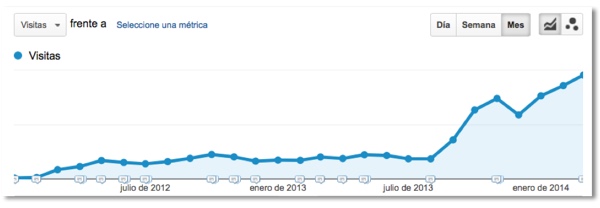Written by Anastasia Kurmakaeva
Index
The concept of not provided refers to the impossibility, on the part of web traffic analytics systems, to identify the organic searches that users entered to find and visit a website. The term refers to the fact that this search is not provided by the search engine, so it cannot be picked up by the traffic analysis system that presents these organic traffic visits grouped under the same generic search called (Not provided).
History of “not provided”
Google decided in October 2011 to encrypt searches performed by users who were logged into the search engine at the time of the search. Google’s arguments were that this would better protect the security and privacy of users, as it would make it impossible for a traffic analysis system to attribute a particular search to a particular user.
Although it initially appeared that the percentage of grouped searches under not provided may be small, the fact is that the progressive generalization in the use of GMail and other Google services influenced a growing number of users to stay logged in to the search engine, so that the proportion of not provided visits to Google’s services has increased rapidly.
Subsequently, in the fall of 2013 Google extended anonymous search also to users who were not authenticated – logged in – to the search engine. As a result, the percentage of organic traffic for which we do not know with which searches they found our website is increasing, which makes the information reflected in the keyword section of any Web analytics system practically useless.
It should be noted that, in addition to encrypting the search (Google now uses the secure https protocol on its servers), Google routes the visit from the click on a result through a redirect that occurs on an intermediate page. This makes it inaccessible for any Web analytics system to query any data from the referrer (page of origin) of the visit.
SEO consequences of Not provided
The consequences of the implementation of anonymous search on Google and other search engines has resulted in information about user searches coming from natural search engine results being encrypted and therefore unavailable, i.e., Not provided for any Web analytics system.
This prevents us from discriminating between branded organic traffic (Branded SEO) and generic organic traffic (non-Branded SEO), as well as making it impossible for us to measure indicators of visit quality and conversion based on the search origin of the visit.
Alternatives to not provided
Different alternatives have been proposed to recover lost information from organic traffic source searches:
- Data extrapolation methods: increasingly unreliable because the available sample of keywords we know is smaller.
- Google Search Console: an alternative query to know the keywords that bring traffic to the portal is the Search Traffic menu > Search Analysis of Google Search Console.
- Keywords used by users in Google AdWords.
- Analysis of the internal search.
- Landing-page centric models: in which a keyword is associated with an organic traffic landing page.
Additionally, there are user panel methods that can access the searches performed in Google as they take this information from the user’s own browser.
References on Not provided
When Keyword (not provided) is 100 Percent of Organic Referrals, What Should Marketers Do? – Rand Fishkin.
Smarter Data Analysis of Google’s https (not provided) change: 5 Steps – Avinash Khausik.
SEO analysis today: towards the “landing-centric ” model – Iñaki Huerta.
Not provided: towards SEO without keywords? – Fernando Maciá.
